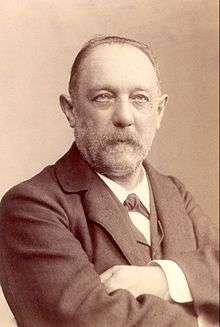Emanuel Mendel
- For the prominent curbstone broker, see Emanuel S. Mendels

Emanuel Mendel (October 28, 1839 – June 23, 1907) was a German neurologist and psychiatrist who was a university professor (from 1884 an associate professor) and director of a polyclinic in Berlin. He was born in Bunzlau, Lower Silesia; (today known as Bolesławiec, Poland).
He studied medicine in Berlin and in 1871 received his habilitation for psychiatry.[1] Mendel was an advocate in regards to the unification of psychiatry and neurology as complementary disciplines. Among his better-known students and assistants were Max Bielschowsky (1869–1940), Edward Flatau (1869–1932), Lazar Minor (1855–1942) and Louis Jacobsohn-Lask (1863–1940)
Mendel is remembered for the introduction of duboisine, an extract from the Australian plant Dubosia myoporoides, as a treatment for Parkinson's disease. Also, he conducted important studies of epilepsy and progressive paralysis.[1]
Among his medical writings was a textbook on psychiatry titled Leitfaden der Psychiatrie für Studirende der Medizin (1902), later translated into English and published as "Text-book of psychiatry : A psychological study of insanity for practitioners and students".[2][3] Also, he was founder and publisher of the neurological/psychiatric magazine Neurologisches Centralblatt.[1]
Mendel was interested in politics, and was a member of the Reichstag from 1877 to 1881.[1]
References
- Parts of this article are based on translations of articles from the German and Polish Wikipedia.
- Duboisia myoporoides: the medical career of a native Australian plant at the Wayback Machine (archived February 26, 2005)
- 1 2 3 4 Biografie, Emmanuel Mendel Wissenschaftliche Sammlungen an der Humboldt-Universität zu Berlin
- ↑ IDREF.fr
- ↑ Open Library Text-book of psychiatry
- E Mendel (1907). Text-book of psychiatry. Davis.